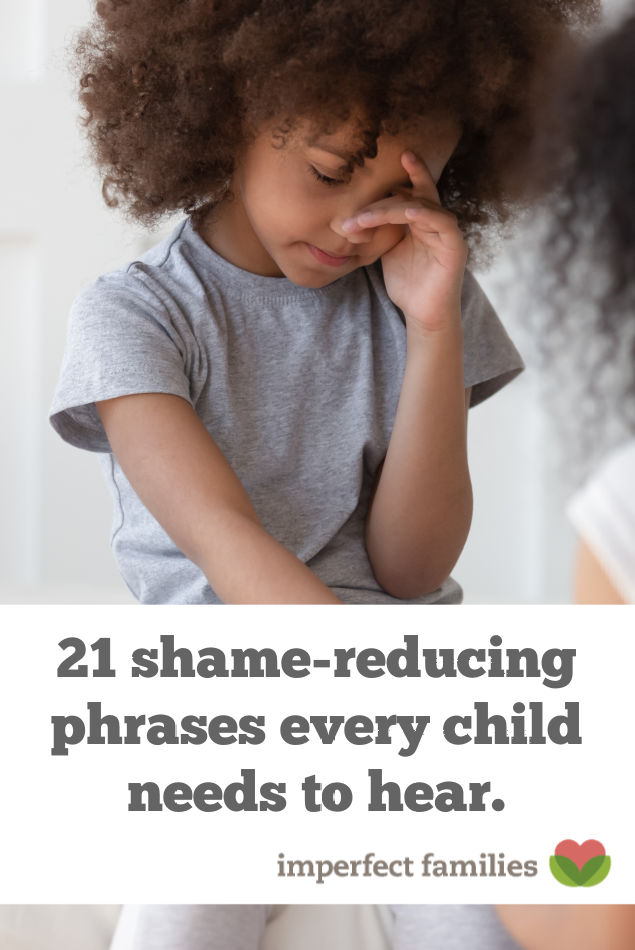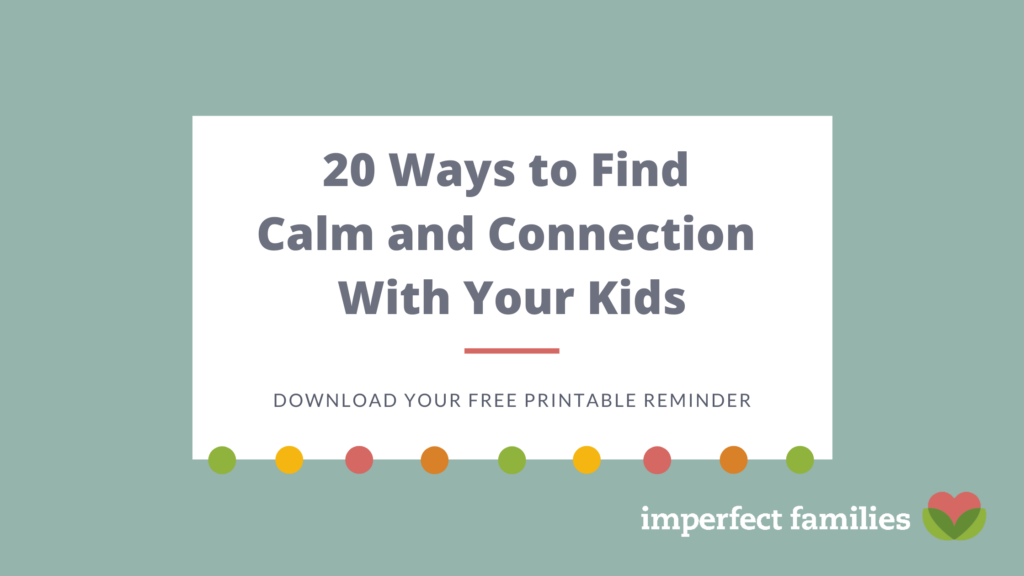Is your child stuck in the “I’m a bad kid” cycle? Caregivers can reduce the effects of shame, using these phrases to remind your child that they are seen, known, and loved.

Shame is a powerful force.
It sends the message that you are not worthy of love. It tells us we should hide our true selves because people would reject us if we were honest and vulnerable.
Messages of shame can begin to be internalized in the toddler years. And even if we, as parents, never explicitly send these messages, some kids may find themselves stuck in an “I’m a bad kid” cycle.
The “I’m a Bad Kid” Cycle
Let’s imagine your child acted in a way that would be labeled “misbehavior.” This could be something developmentally appropriate, such as dropping an ice cream cone accidentally, or something that appears intentional, such as yelling “I hate you!” during an argument.
Your child watches your reaction for information about how to feel in this situation.
If you, as the parent responds by criticizing, berating, yelling at, or minimizing, the child may start the cycle: “My parent thinks I’m a bad kid.”
As a reaction to this yucky feeling, some kids begin to act out even more.
You may become even more upset by their behavior. Unintentionally sending the message: “You’re a bad kid.”
Even if they wanted to change, some kids struggle to move forward – embracing perfection, struggling to problem-solve through mistakes, or seeing big feelings as something to be avoided.
Over time, the thought, “I am a bad kid” becomes ingrained. Their behavior reinforces this belief. Your response reinforces this belief.
And they become stuck in the “I’m a bad kid” cycle.
This cycle is fueled by shame.
Shame says, “Your parent can’t love you! No one loves someone with this behavior! Your parents think you are a bad kid. You are a bad kid. Put up your defenses!”
Read more about combatting shame with respectful parenting here.
Thankfully, recognizing the “I’m a bad kid” cycle can help us shift the way we parent. Working to combat the shame-filled messages our child believes. Building a strong bond with them, in the good times and the difficult times.
Let’s start by adding a few of the following phrases into your dialogue.
Even in the hard moments.
Maybe especially in the hard moments. The meltdowns, the arguments, the aggression, the big feelings.
In these moments, your child needs nothing more than to be seen and supported.
For many kids, the “I’m a bad kid” message rings so loudly and feels so true that we need to work even harder to chip away at their shame-filled defenses. We can help by showing our kids that they are loved when they feel the most unloveable.
21 Phrases to Reduce Shame
- You are a valuable part of our family.
- Feelings are normal. Yes, even the big, hard, messy, uncomfortable ones.
- Everyone feels that way sometimes.
- I remember a time I felt that way…
- Let’s think of another way you can tell me how you’re feeling.
- Everyone makes mistakes.
- I love spending time with you.
- You made a brave decision.
- I noticed…I saw…this great thing you did.
- I know you’re working hard.
- No perfect people live here.
- We’re all growing and learning.
- Those feelings feel so big (or overwhelming, or scary, or lonely).
- Sometimes it’s hard to manage our feelings and that’s ok.
- There is nothing wrong with you.
- You’re a good kid.
- I am here for you.
- There is nothing that will change my love for you.
- Mistakes do not define you.
- Your feelings are not too big scary for me.
- I’ve got you.
- I love you.
I know, that’s 22. But I don’t think there’s a limit to how many shame-reducing phrases we can add to our conversations.
Our kids need to hear these messages.
Even the kids who don’t battle shame.
The kids stuck on the “I’m a bad kid” cycle need to hear them many, many, many times before they start to replace their familiar (yet, unhelpful) shame-inducing messages.
Can you relate?
Many parents are stuck in the “I’m a bad parent” cycle.
If you feel this way, you are not alone.
Breaking through shame can feel like an overwhelming task. You may feel defeated before you even begin. You may need to reach out for support from a mental health provider. You may need to be vulnerable in a community of supportive, caring adults.
You may need to write your own list of shame-reducing phrases and repeat them to yourself often.
Shame wants us to hide, but there is no shame in needing support in your parenting. We are all growing and learning! None of us have it all figured out. Your mistakes do not define you.
You are loved.



Comments have been turned off to retain the privacy of all families. If you have a question or comment on the topic, you're always welcome to contact me.